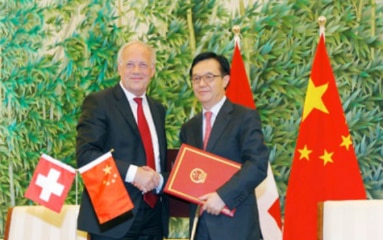Background

A comprehensive bilateral Free Trade Agreement (FTA) between Switzerland and the People’s Republic of China was signed by Federal Councillor Johann N. Schneider-Ammann and the Chinese Minister of Commerce Gao Hucheng on July 6th 2013. A bilateral Agreement on Labour and Employment was signed simultaneously by Federal Councillor Johann N. Schneider-Ammann and the Chinese Minister of Human Resources and Social Security Yin Weimin.
Following initial preparatory talks in November 2007, joint workshops in collaboration with the private sector in 2009 and a Joint Feasibility Study in 2010, the negotiations were officially launched in 2011. The Agreement was then negotiated in nine rounds and various intersessional meetings from April 2011 to May 2013. After the signature of a Memorandum of Understanding on Concluding the Negotiations during the official visit of Premier Li Keqiang to Switzerland in May 2013 and the notification of the completion of the internal ratification procedures on April 29th 2014, the FTA entered into force on July 1st 2014 and the Agreement on Labour and Employment on June 9th 2014.
